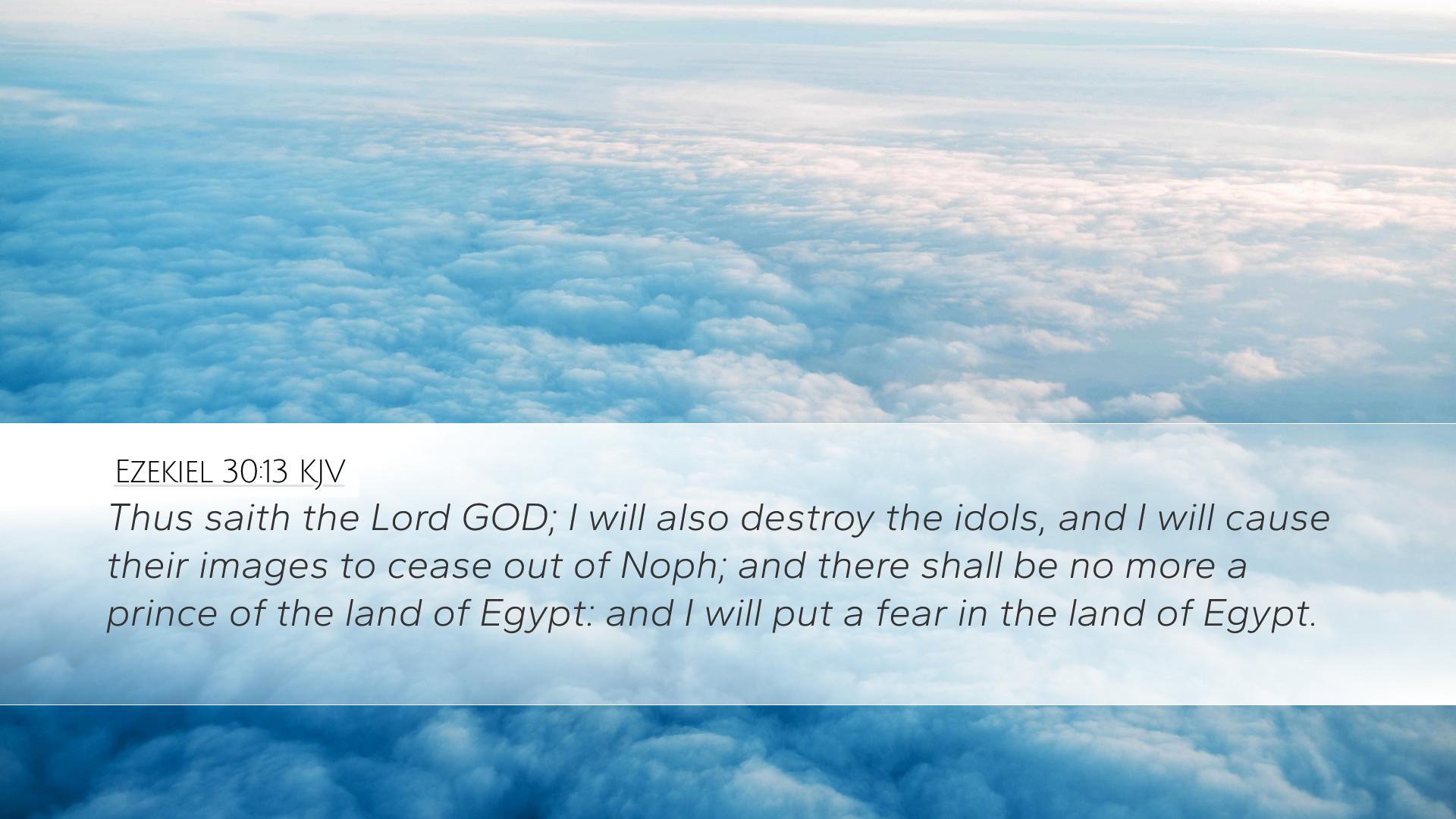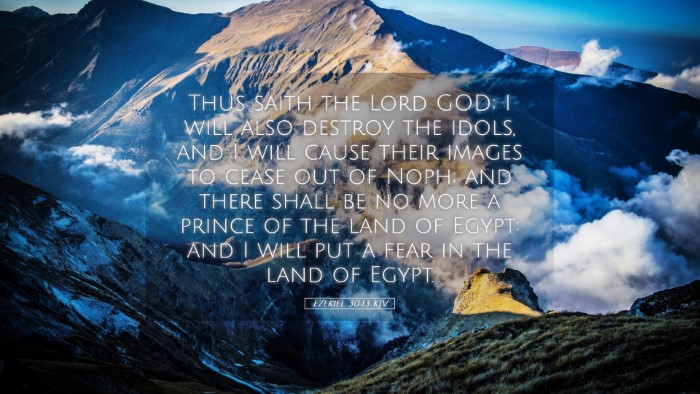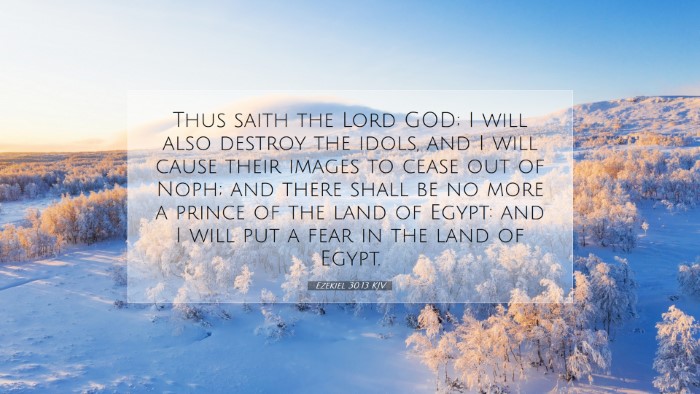Commentary on Ezekiel 30:13
Bible Verse: "For thus saith the Lord God; I will also destroy the idols, and I will cause their images to cease out of Noph; and there shall be no more a prince of the land of Egypt: and I will put a fear in the land of Egypt."
Introduction
This verse from Ezekiel reflects a pivotal moment in prophetic literature, emphasizing God's sovereignty over nations, particularly Egypt. The destruction of idols and the absence of Egyptian leaders encapsulate divine judgment and the restoration of monotheism. Public domain commentaries provide keen insights into the implications of this prophecy, addressing both its immediate context and broader theological significance.
Contextual Analysis
The prophecy concerning Egypt arises within a series of oracles directed towards the nations surrounding Israel. Ezekiel, a priest and prophet, conveyed messages of judgment that aimed to call his audience—not only the people of Israel but all nations—to recognize the power of the God of Israel. This verse captures a moment of desolation for Egypt, a nation often symbolizing polytheism and pride.
Idol Destruction
Matthew Henry highlights that the destruction of idols signifies a definitive eradication of false worship. The term 'idols' relates not just to physical statues but to any objects of misplaced trust. In this context, Egypt's reliance on these idols for protection and prosperity would ultimately lead to their downfall.
Albert Barnes elaborates that the mention of Noph (also known as Memphis), a significant religious center in ancient Egypt, indicates a targeted divine intervention. The idea is that God will not only remove the physical representations of false gods but will also obliterate the worship practices associated with them. The imagery of a cleansed land enriches the narrative of divine realism confronting human rebellion.
Ceasing of Images
The caustic prophecy of ceasing images effectively calls into question the futility of idolatry. Adam Clarke notes that the images were not merely decorative objects but were imbued with cultural significance and power, reflecting the Egyptian society's reliance on these representations for their identity. The judgment upon these images reveals God's disdain for idolatry and sets a precedent for the recognition of His supremacy.
Absence of a Prince
The absence of a prince underscores the political implications of God's judgment. Without leaders, the nation lacks direction, indicating profound instability. Matthew Henry points out that God’s removal of leadership serves as a consequence of Egypt's spiritual unfaithfulness. Leadership in any nation can be fractious when detached from divine will, leading to chaos and desolation.
Albert Barnes argues that God’s action here serves not only as a punishment for Egypt but also as a warning to Israel. If they continue to align themselves with a nation steeped in idol worship, they too could experience similar consequences. Therefore, the prophetic tone serves dual purposes—addressing Egypt and admonishing Israel.
Theological Implications
This verse touches on broader theological themes, such as God's authority over nations and the ultimate futility of human idolatry. By referencing Noph, Ezekiel evokes an extensive historical backdrop, where Egypt often symbolized opposition to Yahweh.
Divine Sovereignty
Adam Clarke emphasizes that the prophecy conveys God's sovereign control over history and governments. Even powerful nations are subject to His will. The destruction of Egypt’s idols and leaders correlates directly with God’s redemptive plan for His people, showcasing that He can raise and lower nations at His discretion. Hence, the text reassures believers of God's ultimate control in tumultuous times.
Futility of Idolatry
Matthew Henry reinforces the notion that all forms of idolatry lead to decline and destruction. God's command to cease idol worship transcends cultural boundaries, serving as an eternal admonition to all who seek solace in earthly constructs instead of divine truth.
Albert Barnes complements this reasoning by engaging with the nature of reliance on ‘princes’ and leaders, arguing that they become mere tools of the divine narrative. As Egypt loses both its leaders and idols, it becomes a stark illustration of brokenness devoid of God’s support.
Application for Believers
This verse challenges contemporary believers to evaluate what functions as 'idols' in their lives. Here are some practical takeaways:
- Self-reflection: Believers must identify any modern-day idols—whether material possessions, ambitions, or relationships—that divert their devotion away from God.
- Courage in Leadership: Those in leadership must acknowledge their dependence on God for wisdom and guidance, avoiding the pitfalls of relying on human strength.
- Shared Responsibility: Just as the judgment fell upon nations, Christians are reminded of their collective responsibility to uphold God's truth in society, rejecting the allure of contemporary idols.
Conclusion
Ezekiel 30:13 serves as a powerful reminder of God's judgment against idolatry and the transitory nature of human authority. The combined perspectives of noted commentators highlight the text's significance for understanding God's sovereignty and the dire consequences of leading lives detached from Him. As modern-day readers engage with this passage, may it stir a deeper devotion to God, recognizing His authority over every aspect of existence.


